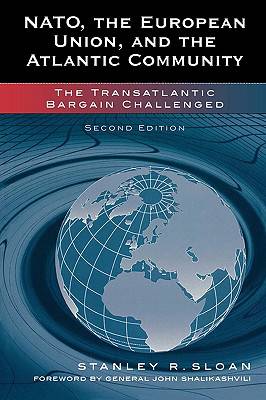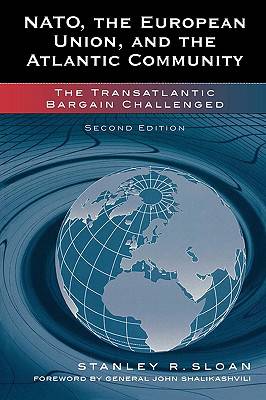
- Afhalen na 1 uur in een winkel met voorraad
- Gratis thuislevering in België vanaf € 30
- Ruim aanbod met 7 miljoen producten
- Afhalen na 1 uur in een winkel met voorraad
- Gratis thuislevering in België vanaf € 30
- Ruim aanbod met 7 miljoen producten
Zoeken
NATO, the European Union, and the Atlantic Community
The Transatlantic Bargain Challenged
Stanley R Sloan
Paperback | Engels
€ 106,95
+ 213 punten
Uitvoering
Omschrijving
Now fully revised and updated, this accessible and astute text provides a full interpretive history of the transatlantic alliance and explores critical developments in U.S.-European relations. Stanley R. Sloan considers the ongoing pattern of U.S. unilateralism and its consequences as the transatlantic and intra-European debate over Iraq produced deep splits among the allies and seriously eroded European trust in U.S. leadership. Ironically, at the same time, the United States and Europe have made historic choices concerning NATO's future, not only continuing the process of enlarging alliance membership but also expanding NATO's missions to include peacekeeping and enforcement without geographic limitation. Sloan also enlarges on his ideas for a new Euro-Atlantic pact, a call that has now been echoing in both European and American quarters. Assessing both the good and bad news for the alliance, this book remains a central text for college and university courses on U.S.-European relations and transatlantic security issues and thought-provoking reading for all citizens concerned about future U.S. foreign policy and Europe's role in it.
Specificaties
Betrokkenen
- Auteur(s):
- Uitgeverij:
Inhoud
- Aantal bladzijden:
- 352
- Taal:
- Engels
Eigenschappen
- Productcode (EAN):
- 9780742535732
- Verschijningsdatum:
- 28/07/2005
- Uitvoering:
- Paperback
- Formaat:
- Trade paperback (VS)
- Afmetingen:
- 160 mm x 228 mm
- Gewicht:
- 453 g

Alleen bij Standaard Boekhandel
+ 213 punten op je klantenkaart van Standaard Boekhandel
Beoordelingen
We publiceren alleen reviews die voldoen aan de voorwaarden voor reviews. Bekijk onze voorwaarden voor reviews.











